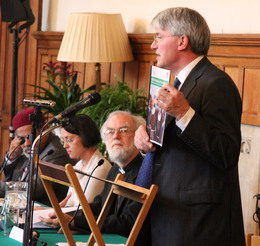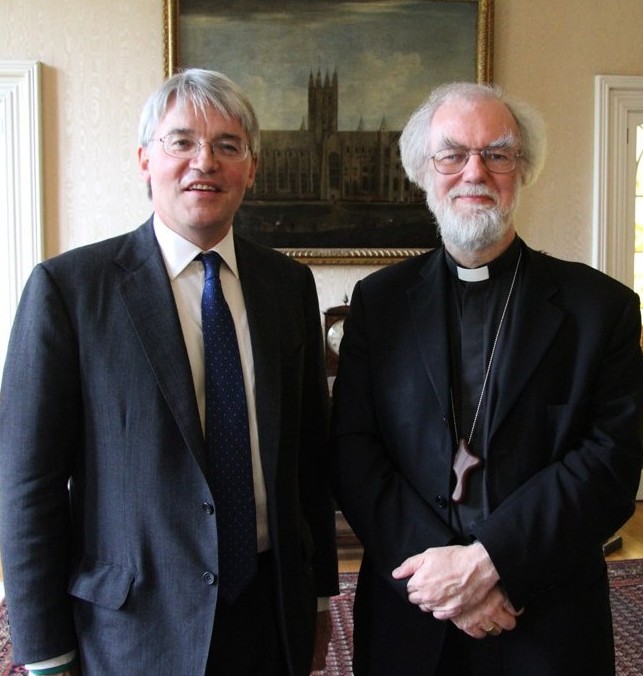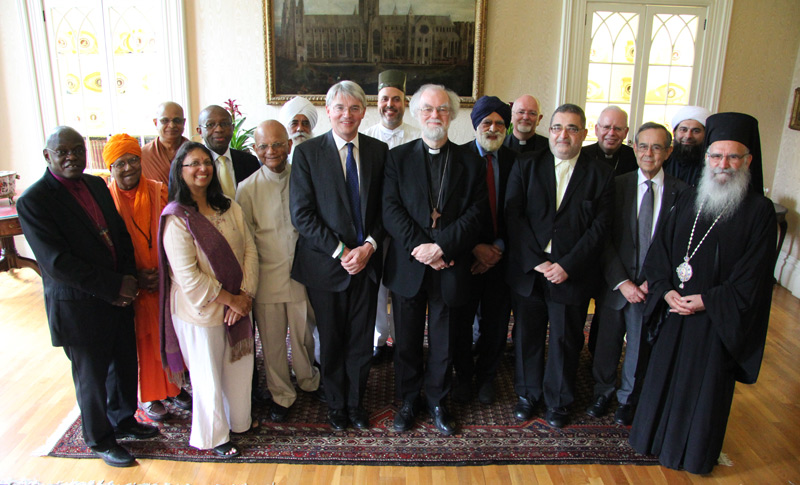'Faith, Poverty and Justice' - Lambeth Palace Inter-Faith Event with DFID

Tuesday 26th June 2012
Lambeth Palace hosted a launch of the Department for International Development’s 'Faith Partnership Principles' by Secretary of State, Andrew Mitchell.The document (pdf available here) has been produced by DFID in consultation with a working group from faith-based development organizations across the faith spectrum. The paper sets out principles to guide DFID’s relationship with faith groups, to build greater common understanding, mutual respect and cooperation in overcoming poverty.
This initiative represents a significant moment in inter faith relations with faith based development organisations bringing together resources of their different traditions in the service of the world's poorest people. As the Archbishop said, "What we share with each other as faith communities is a vision of humanity that speaks not just of rights but of the honour due to human beings, an honour that informs and drives our commitment to international development." The launch was followed by a panel discussion and debate, convened by Dr Rowan Williams, on the subject of ‘Faith, Poverty and Justice’, with an audience of senior leaders from across the faith communities and faith-based development organizations.
The Archbishop welcomed the launch of DFID’s paper, saying:
“The distinctive contribution of faith-based organisations and faith communities in the humanitarian and development arena is increasingly recognised. I believe that there is great potential in promoting mutual understanding, critical engagement and collaborative action between governments, civil society and faith communities in promoting global justice and sustainable development.”
 In putting its Faith Partnership Principles into Practice, DFID will work with faith groups to: identify three priority countries for collaborative learning and action; facilitate an inter-faith forum for open and frank debate; and keep faith groups informed about funding opportunities. The paper states: “In many countries, and for many people, faith and religion are central to development… Faith enables them to understand and relate to the world.”
In putting its Faith Partnership Principles into Practice, DFID will work with faith groups to: identify three priority countries for collaborative learning and action; facilitate an inter-faith forum for open and frank debate; and keep faith groups informed about funding opportunities. The paper states: “In many countries, and for many people, faith and religion are central to development… Faith enables them to understand and relate to the world.”
In the foreword, Andrew Mitchell wrote:
“Faith makes such an important contribution to development…. Faith groups are doing excellent work in providing not only humanitarian relief, but delivering health, education and other services in some of the most troubled parts of the world… I look forward to the closer partnership with people of faith who play a unique role in fighting poverty.”
Listen here to the Archbishop's introduction and Andrew Mitchell's speech [14Mb, 10 mins] or read a transcript.
Listen here to the Archbishop's response to Andrew Mitchell's speech [4Mb, 5 mins] or read a transcript.
Faith groups play a central role in tackling poverty. They are often the first line of support to the poor. They remain serving communities before, during and after times of crisis and conflict. They provide health and education services. In some African countries, faith groups provide up to 70% of health services.
The Archbishop of Canterbury was joined on the panel discussion by Professor Gurharpal Singh, Professor in Inter-Religious Relations and Development at the School of Oriental and African Studies, Dr Severine Deneulin, Lecturer in International Development at the University of Bath, and Mr Fuad Nahdi, Executive Director of Radical Middle Way.
Listen here to Professor Gurharpal Singh's speech [10Mb, 15 mins]
Listen here to Dr Severine Deneulin's speech [16Mb, 22 mins]
Listen here to Mr Fuad Nahdi's speech [11Mb, 16 mins]
Listen here to Archbishop Rowan Williams' concluding remarks [7Mb, 10 mins]

Secretary of State Andrew Mitchell, Archbishop Rowan Williams and senior faith leaders at Lambeth Palace.
See transcripts below of the speech made by Andrew Mitchell and Archbishop Rowan Williams' response.
Launch of Faith Partnership Principles
by Andrew Mitchell, Secretary of State for International Development
Welcome by the Archbishop of Canterbury, Dr Rowan Williams:
Secretary of State, panellists, honoured guests, ladies and gentlemen; it is a great delight to welcome you here at Lambeth for something of a historic occasion. The document that we’re launching this evening brings together two worlds about which many people in this room are deeply and passionately concerned: the world of inter-faith harmony and reconciliation, and the world of international development. In recent years we’ve worked consistently to produce some kind of common mind and common approach between ourselves and Government on this subject, and it’s a very great delight, Secretary of State, to welcome you here this evening to launch this document and to speak to us about something of your vision of how these two worlds come together.
We know that your time is short, so I won’t take up any more of that time now, but simply welcome you most warmly to this rather unusual and distinguished gathering. We’re looking forward greatly to what you have to share with us.
Speech by the Rt Hon Andrew Mitchell MP, Secretary of State for International Development:
Archbishop, ladies and gentlemen; it’s a huge privilege and honour for me to come here tonight to launch the Faith Partnership Principles paper. When we came into Government, we were very concerned that the link for development between all the many faith communities and the Department for International Development was not as close as it could be or should be. Indeed I think, Archbishop, it was at the Synod that I committed that we would work together as closely as possible to produce a paper of principles which could govern a much closer relationship than the one which existed before. I’m delighted that we have now managed to produce this paper which I am launching today, which sets out very clearly some of principles which all of us in this room are honouring tonight. I know that, looking across this audience, there are many people here who are experienced and dedicated from faith communities all across the United Kingdom, and that we all share the same goal of eradicating poverty.
I want to start by saying that we have this week been able to publish the Annual Report from my Department about the progress that is being made in securing the results that we promised to gain from British aid over the past two years. We have, for example, been able to report to Parliament that we’ve vaccinated over 12 million children against preventable diseases; that we’ve distributed 12.2 million bed nets to protect children against malaria; we’ve improved the land and property rights of 1.1 million people; reached six million people with emergency food assistance, and supported freer and fairer elections in five countries. I could give you many more details of what we have achieved, but I would like to refer you to the Annual Report which is available on the website.
I mentioned a moment ago the speech I made at the Synod of the Church of England just over a year ago, where I promised that we would convene this working group across all faiths with the remit of producing some practical suggestions for closer working between Government and faith groups. Thanks to the effort of the group that oversaw this work, we’re now in a position to take forward all those conclusions that we have reached together. The Faith Partnership Principles paper contains some very practical ideas that you can share with your mosques and churches and places of worship. Underpinning the paper and the relationship between government and faith groups are the principles of transparency, mutual respect and understanding.
Transparency is important because people need to be able to see how and where their money is being spent. It’s why I introduced the UK Aid Transparency Guarantee – we now publish all spending above £500 on our website – and indeed introduced the new aid watchdog, the Independent Commission on Aid Impact, which allows people to see, independently corroborated by experts, the effect of British aid and means they don’t have to rely on the words of politicians and ministers.
But respect and understanding are also important. We know that while faith often brings people together, it can sometimes lead to divisions, and of course it is the poorest that suffer most. The challenge is to develop ways of working that help faith groups and my Department to discuss areas of difference constructively. And it can be done – we’ve seen Islamic Relief and CAFOD working together in conflict and disaster areas. Their alliance has helped save thousands of lives in Afghanistan and Chechnya, Niger and El Salvador, where one organisation has worked with or through another. We need to see more of this sort of collaboration.
Looking to the future, Archbishop, I want to see this paper laying the foundation for stronger and more productive relationships between government and faith groups. Faith groups are an important part of the fight against poverty. I saw that when, on my very first visit doing this job in opposition some seven years ago, I went to Uganda and saw the extraordinary work of a CAFOD-supported charity, the Medical Missionaries of Mary. I saw the quite extraordinary way in which this small but brilliant organisation was bringing hope and help to communities suffering from HIV/AIDS to orphan families who were assisted in this quite extraordinary way by the Medical Missionaries of Mary.
I was so moved, Archbishop, by this experience, that when I got back to my constituency of Sutton Coldfield, I wrote a column in my local paper about the brilliance of this organisation I had seen. About a week later I got a letter in tiny handwriting from a lady who said “Mr Mitchell, you clearly don’t know that you have a support organisation in your own constituency for the Medical Missionaries of Mary which has raised over £30,000 in recent years.” I immediately, in a spirit of very serious humility, went to their committee meeting where none of them were under the age of 80. They had dedicated years and years of their lives to raising money in the community in Sutton Coldfield for this brilliant charity.
I’ve been encouraged by the response of some of the smaller faith groups to the GPAF, the Global Poverty Action Fund, which we set up as a means of providing government funding for charities who are achieving these brilliant results in the development field. The Global Poverty Action Fund operates on the basis that if a charity, through raising some of its own money, is able to achieve brilliant results on the ground, and if the taxpayer by, say, doubling the money that charity is raising can then see double the effects and results on the ground, then that is a brilliant deal for the British taxpayer in getting two for one, and hopefully a brilliant deal for the charity, voluntary organisation or faith group which is also able to provide two for one. I believe, Archbishop, it’s known in the commercial trade as a BOGOF – Buy One, Get One Free. It is the core principal behind the work of GPAF, which I have seen already supporting the Karuna Trust, the South African Catholic Bishops Conference, and the Adventist Development and Relief Agency. I hope that GPAF will be the key mechanism by which we work together with faith groups all around the world in the poorest parts, taking forward this important mission which so innervates and guides us all.
All of us here tonight share the conviction that a more prosperous and peaceful world is the best legacy we can leave for future generations. Achieving that ambition will mean using every means at our disposal: tackling conflict, improving maternal health, engaging the private sector, that engine of growth, and responding to crises promptly and effectively. But it also means working together, finding ways to build on what unites us. The paper which we are publishing today is one important part of that jigsaw. I’m tremendously grateful to all those who have taken part in its development, not least the working group that had such a key role. I have seen, Archbishop, all around the world, in some of the most difficult and fractious places, the way in which it is faith groups which have kept the light of optimism and hope going. I have seen the way in which quite often it is faith groups that provide health and education when there is no-one else to do it. And I look forward to building on those inspiring examples, engaging with the faith community in the future, so that all of us can take that work forward as we battle to eliminate these colossal discrepancies of opportunity and wealth, which disfigure our world today. Thank you very much.
© Andrew Mitchell 2012
Response by the Archbishop of Canterbury, Dr Rowan Williams
I think, like all here, that it’s crucial that we welcome the commitment that’s been expressed in this paper and the commitment of DFID to its mission and vision, and to working with faith communities in achieving it. I remember very well, Secretary of State, your address to Synod and the passion that you brought to that which greatly touched many of us. I think that commitment has been fleshed out in a very concrete and very helpful way in this paper.
I was reminded of a time in my period as bishop of Monmouth in south Wales, (and other bishops here will recognise something of this story, I think) where I was in the painful process of putting together two parishes that didn’t very much want to go together, Cwmtillery and Abertillery. As the names indicate they were about a mile apart. I was told that it was absolutely impossible for these two villages to come together into a single parish because their history and their culture were so totally different. Having eventually seen this through, with a certain amount of blood on the carpet, I remember visiting the united parishes some six months later to be addressed by one of the senior people in the parish with the words “You should have done this years ago, Bishop!” Something of that echoes in my mind tonight – we should have done this years ago, Secretary of State!
We have for many years, here from Lambeth Palace and in other forums, been in dialogue with DFID to see what we can do to bridge the cultures of different organisations and to make it absolutely clear that the vision that we share is a convergent, not a divergent, one. We’ve been concerned also to say to successive governments that the capacity of faith communities at local level/grassroots level to deliver with the Millennium Development Goals is unparalleled. We want to have our resources, our skills, our networks at the service of that vision. And what this paper allows us to say is that you are now welcoming those skills, those networks, towards such a vision and such an end.
We are very grateful for that. Grateful for the emphasis on respect for what faith communities are and do. Grateful for the emphasis on the need for faith literacy in a political culture, which, if I may say as gently as I can, is not always – whatever the political colouring – as advanced as it might be in that respect. Grateful too for being called to account, because we must not be allowed to get away with shoddy, second-rate, imperfect, amateurish work simply because we hide under the banner of faith. We are very glad to be challenged, called to account, and pushed to achieve the best we can in that respect.
The reservations that have been expressed about the language of aid are reservations which I think are very widely shared. ‘Aid’ is an ambiguous word; ‘development’ is a much less ambiguous word although it has its critics. But I prefer on these occasions to talk most about ‘transformation’. Our communities are all of them committed to transformation in one way or another. All of us believe that human beings are capable of more than they thought they were, and aid and development are going to be trivial and demeaning and fundamentally unsuccessful unless they tackle that basic question of transformation.
How are people going to be able to act with the shared freedom and the shared vision that they’re capable of? That, it seems to me, is a vision we can properly share, properly expect to be called to account about, and properly call others to account about as well. When you speak of the need to check the evidence of change and to respond according to that, I think we are willing to accept that as a perfectly proper criterion. Evidence of change is evidence of liberation and transformation, and that is what we want to see as well.
So we look forward to a partnership, perhaps deeper, more active, potentially more critical and demanding than before, but also I think more full of potential for that transformation. This is a watershed moment and a document of real importance. We are delighted that the long process of dialogue and investigation that has been going on for the last ten years or so, between faith communities and DFID, has issued in this work. We’re very grateful to the civil society team of DFID for all their labours in producing it. We wish you well in your own vision – your own calling, if I may say so – in this role. We commend all that we are reflecting on together, all that we hope to do together, to God’s grace and indeed God’s mercy as we proceed in this work. Thank you so much.
© Rowan Williams 2012
